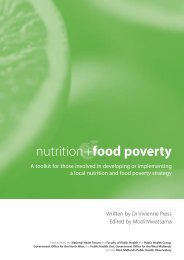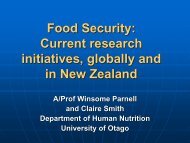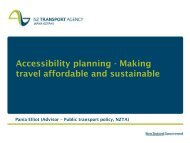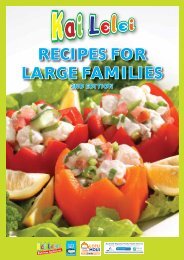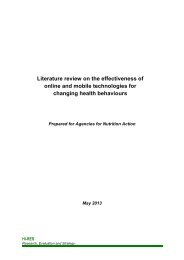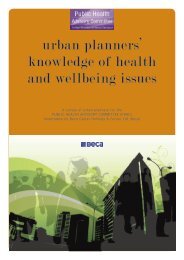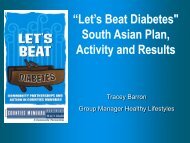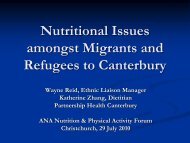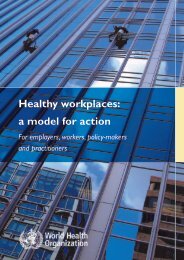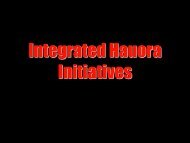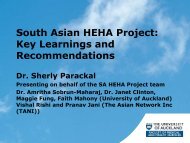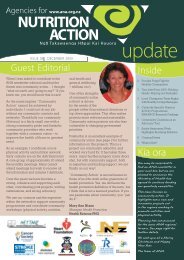enhancing food security and physical activity for maori, pacific and ...
enhancing food security and physical activity for maori, pacific and ...
enhancing food security and physical activity for maori, pacific and ...
- No tags were found...
Create successful ePaper yourself
Turn your PDF publications into a flip-book with our unique Google optimized e-Paper software.
Enhancing Food Security <strong>and</strong> Physical Activity <strong>for</strong> Māori, Pacific <strong>and</strong> Low-income Peoplesunderst<strong>and</strong>ing of the issues <strong>and</strong> potential solutions that no individual could have arrivedat alone.However, even with the range of expertise represented in the research team, taking aholistic view of <strong>food</strong> <strong>security</strong> <strong>and</strong> <strong>physical</strong> <strong>activity</strong> meant that some interventions wereoutside the team’s existing knowledge base. Considering iwi/ pan tribal development oftraditional <strong>food</strong> sources, <strong>for</strong> example, or the market of fringe credit lending institutions,are outside the direct experience of research team members. As a result, a weakness ofthe research is the lack of detail in some of the intervention recommendations, whichcould be improved by more specific expertise. Key in<strong>for</strong>mant interviews were used whenconsidering interventions, where resources allowed, as an attempt to address thisweakness.Whilst a comprehensive systems view was taken of <strong>food</strong> <strong>security</strong> <strong>and</strong> <strong>physical</strong> <strong>activity</strong>causation <strong>and</strong> solutions, it was necessary to limit the scope of the research at eachphase. From the inclusion criteria of the initial comprehensive literature reviews, throughto the selection of interventions <strong>for</strong> focused exploration, possible areas of study havebeen excluded. While limiting the study scope has resulted in a more realistic set ofrecommendations, the weakness is the exclusion of potential interventions that may beeffective in <strong>enhancing</strong> <strong>physical</strong> <strong>activity</strong> <strong>and</strong> <strong>food</strong> <strong>security</strong>. One example may besubsidising household expenses, other than <strong>food</strong>, to increase <strong>food</strong> budgets. Forexample, an association has been noted between both the costs of home heating <strong>and</strong>housing <strong>and</strong> <strong>food</strong> <strong>security</strong>. 6 7 With <strong>physical</strong> <strong>activity</strong>, issues of time <strong>for</strong> <strong>activity</strong>, motivationor technology were identified within the system (see Figure 8-2), but not considered inrelation to interventions. Because of the need in any complex area of investigation tolimit the scope of the study to that which is achievable within a set timeframe <strong>and</strong>budget, the current research should not be considered the final word on <strong>enhancing</strong><strong>physical</strong> <strong>activity</strong> <strong>and</strong> <strong>food</strong> <strong>security</strong> <strong>for</strong> Māori, Pacific <strong>and</strong> low income whānau/families.ConclusionThis book presents the outcomes of a multi-phase, multi-disciplinary, multi-methodresearch project to examine the environmental influences on <strong>food</strong> <strong>security</strong> <strong>and</strong> <strong>physical</strong><strong>activity</strong> <strong>for</strong> Māori, Pacific, <strong>and</strong> low-income families/ whānau (ENHANCE). The originalRequest <strong>for</strong> Proposal from the Ministry of Health <strong>and</strong> the Health Research Council setout a strong rationale <strong>for</strong> action in these areas. The ENHANCE research suggests thataction must include multiple interventions designed to impact across the social systemsfrom which <strong>food</strong> <strong>security</strong> <strong>and</strong> <strong>physical</strong> <strong>activity</strong> emerge. It identifies the need <strong>for</strong> action toinfluence a range of <strong>physical</strong>, economic, political <strong>and</strong> socio-cultural factors within thosesocial systems. The research recognises that action is required across government, iwi,pan tribal organisations, community <strong>and</strong> the <strong>food</strong> industry. A portfolio of interventions issuggested as a starting point <strong>for</strong> improving <strong>food</strong> <strong>security</strong> <strong>and</strong> levels of <strong>physical</strong> <strong>activity</strong><strong>for</strong> Māori, Pacific <strong>and</strong> low-income people. The suggested interventions are not the endpoint <strong>for</strong> addressing these issues. Instead the suggested interventions present aroadmap to begin coordinated <strong>and</strong> comprehensive action. Action needs to be supportedby research, evaluation <strong>and</strong> continual refinement <strong>and</strong> improvement. Importantly, acoordinated portfolio of interventions requires strong government leadership to ensurethat those least privileged in New Zeal<strong>and</strong> are not <strong>food</strong> insecure, nor miss out on<strong>physical</strong> <strong>activity</strong>, but live long productive lives in good health.211



